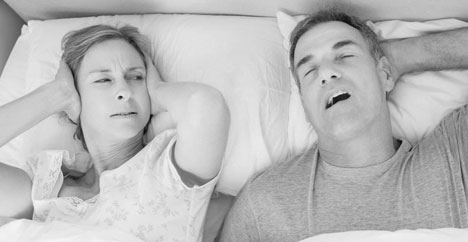Mr William Flannery
Snoring and sleep disturbance in adults
Finding a solution
 Sleep disturbance is miserable
Sleep disturbance is miserable
Snoring and sleep distubance in adults
Over 50% of the population is affected by upper airway noise during sleep. Approximately 6% of the adult population suffers from sleep apnoea (breath holding).
Snoring is a low fequency sound (stertor) made by vibrations of the soft palate and other tissues in the oral cavity, nasal airway & throat. Together they comprise the upper airway.
The low frequency, stertor is caused by turbulence inside the airway on breathing in. There is a partial obstruction located somewhere between the nose and the vocal chords. There may be multiple levels of obstruction. The partial obstruction might be exclusively related to sleep: However in certain cases it may persist all the time and be worse during sleep.
What is the underlying cause of snoring?
The simplest way to understand snoring is to appreciate brain waves during sleep. Brain waves can be fast, slow and mixed. Fast brain waves are associated with normal muscle tone. This tone holds the airway open. In slow wave sleep (delta wave) the muscle tone of the airway decreases. Delta wave sleep is the precursor to Rapid Eye Movement (REM) or dream sleep when we are at our floppiess.
The upper airway is like a drinking straw. Sucking on one end draws up fluid but the walls do not collapse. However if the other end is blocked or the walls are pinched, the straw collapses with the suction (negative pressure).
Would you like to know
more about snoring
and sleep disturbance?
Getting to a snoring solution is a process
The secret to a good outcome is meticulous assessment through the following:
- Detailed history
- Sleep quality questionnaire
- Thorough ENT examination
- Flexible laryngopharyngoscopy (in clinic)
There is a range of treatments
Treatments include sorting out any allergic rhinitis or other causes of nasal block which are very often overlooked. The range of snoring treatments include:
- Sleep hygiene advice
- Rhinitis medication
- Address any bite disorder and bruxism
- Weight loss advice that really works
- Sleep aids and natural remedies
- Septal and turbinate procedures
- Tonsil surgery
- Surgery to the soft palate and uvula
For contact details, see bottom of page








